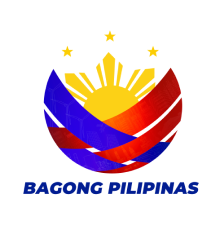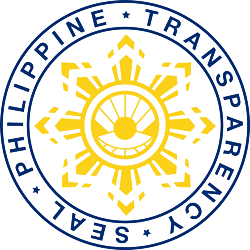TRADE REMEDY SYSTEM

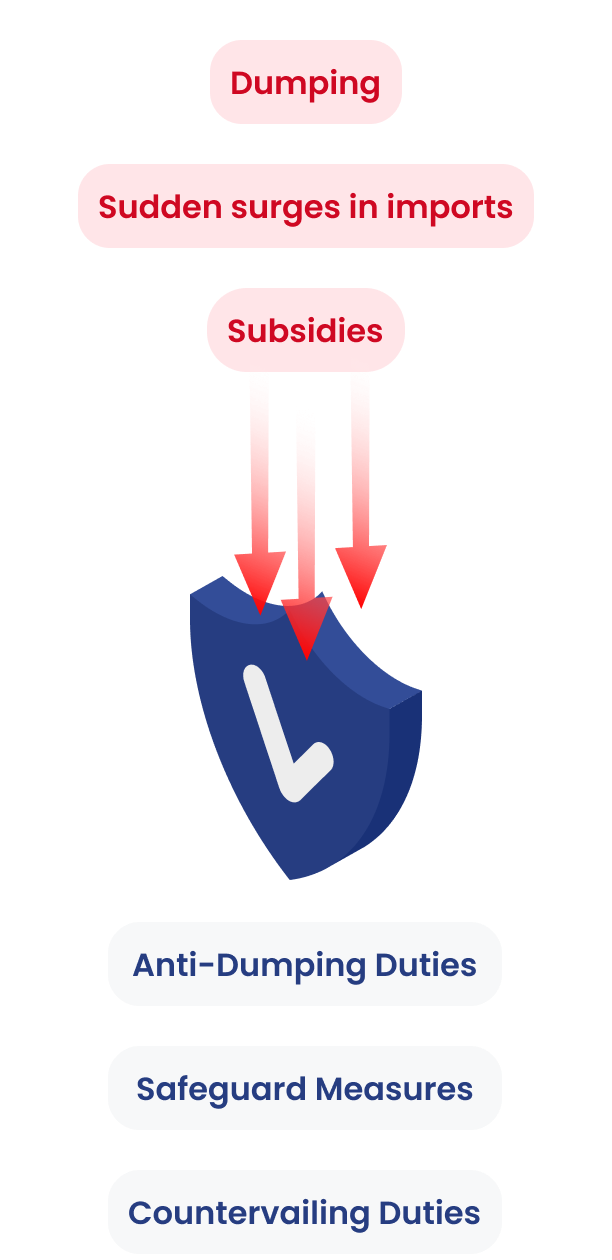
Trade Remedy Measures
Institutions Involved
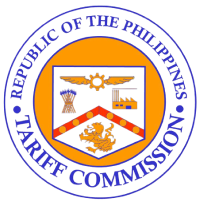
- Tariff Commission (TC)
- Conducts investigations and makes recommendations regarding the imposition of anti-dumping, countervailing, and safeguard measures.
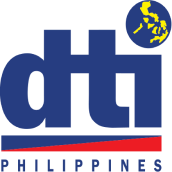
- Department of Trade and Industry (DTI)
- Initiates safeguard investigations and may implement provisional measures.
Dispute Resolution Procedure

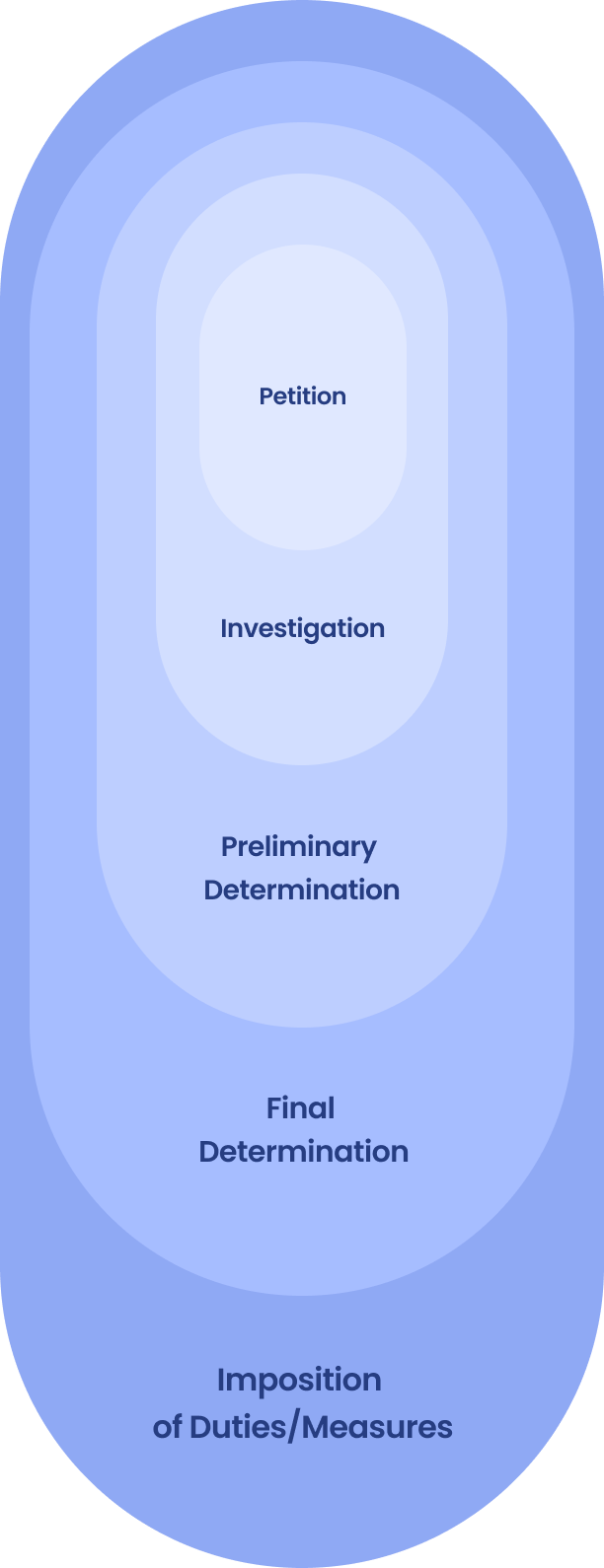
- Petition
- Domestic industries file a petition to initiate an investigation.
- Investigation
- Relevant authorities (DTI, Tariff Commission) investigate to determine the validity of the claim.
- Preliminary Determination
- A preliminary decision on whether to impose provisional measures.
- Final Determination
- A conclusive decision based on comprehensive evidence and investigation.
- Imposition of Duties/Measures
- If the investigation finds merit, the appropriate duties or measures are imposed.
The Philippine trade remedy laws and practices are aligned with WTO agreements, ensuring that they are fair, transparent, and consistent with international standards.
Process Overview
Trade dispute settlement in the Philippines involves a combination of domestic legal frameworks, international trade agreements, and participation in international organizations such as the World Trade Organization (WTO).
Domestic Legal Framework
Philippine Trade Laws
The Philippines has various laws and regulations governing trade, including the
Tariff and Customs Code, the Import Commodity Clearance (ICC) Scheme, and laws
related to intellectual property, consumer protection, and competition.
Disputes arising from domestic trade issues can be settled through local courts
and specialized agencies like the Department of Trade and Industry (DTI).
Arbitration and Mediation
The Philippines recognizes arbitration and mediation as alternative dispute resolution (ADR) mechanisms. The Alternative Dispute Resolution Act of 2004 promotes these methods for resolving commercial disputes, including trade disputes.
International Trade Agreements
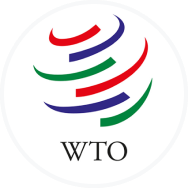
- World Trade Organization
- As a member of the WTO, the Philippines adheres to the WTO's dispute settlement mechanism. This involves consultations, panels, and appellate reviews to resolve disputes between member countries.

- Regional Trade Agreements
- The Philippines is part of various regional trade agreements, such as the ASEAN Free Trade Area (AFTA) and the Regional Comprehensive Economic Partnership (RCEP). These agreements often include provisions for dispute resolution among member states.
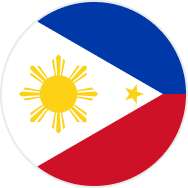
- Bilateral Trade Agreements
- The Philippines has bilateral trade agreements with several countries, which may contain specific dispute resolution procedures.
International Arbitration
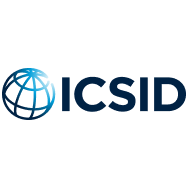
- International Centre for Settlement of Investment Disputes (ICSID)
- The Philippines is a member of ICSID, which provides facilities for arbitration and conciliation of investment disputes between governments and foreign investors.
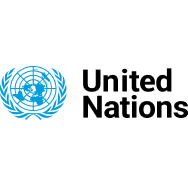
- United Nations Commission on International Trade Law (UNCITRAL)
- The Philippines adheres to the UNCITRAL Model Law on International Commercial Arbitration, providing a framework for international arbitration.
Trade Dispute Cases
The Philippines has been involved in various trade disputes at the WTO, including cases related to tariffs, agricultural products, and intellectual property rights. Domestically, the DTI and other regulatory bodies actively manage trade disputes, ensuring compliance with local and international trade laws.
Reforms and Initiatives

Initiatives to enhance transparency, streamline procedures, and promote ADR are ongoing to foster a more favorable trade environment.
The trade dispute settlement framework in the Philippines is a blend of domestic legal mechanisms and adherence to international trade agreements and arbitration standards, ensuring comprehensive and effective resolution of trade disputes.
Response to Foreign Import Regulations
The Philippines' response to foreign import regulations involves a combination of compliance, negotiation, and adaptation strategies to ensure that its exports meet the required standards and remain competitive in international markets.
The Philippine trade remedy laws and practices are aligned with WTO agreements, ensuring that they are fair, transparent, and consistent with international standards.
Compliance with International Standards
The Philippines aligns its export products with international standards, such as those set
by the World Trade Organization (WTO), the International Organization for Standardization
(ISO), and the Codex Alimentarius for food products.
The country has various regulatory bodies, such as the Bureau of Philippine Standards (BPS)
and the Food and Drug Administration (FDA), which ensure that products meet the necessary
quality and safety standards.
Negotiations and Trade Agreements
The Philippines actively engages in bilateral and multilateral trade negotiations to secure favorable terms for its exports.
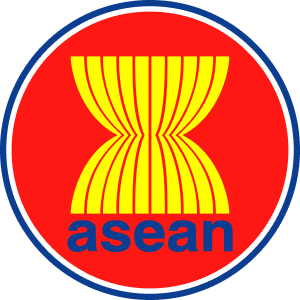
The Philippines also seeks to enter into free trade agreements with other countries and economic blocs to enhance market access for its products.
Capacity Building and Technical Assistance

Initiatives such as the Export Development Council (EDC) and the Department of Trade and Industry (DTI) offer resources and guidance to businesses on international trade requirements.
Quality Improvement and Innovation
Philippine industries invest in improving product quality and adopting new technologies to
meet foreign import regulations.
The government encourages innovation and research and development (R&D) to enhance the
competitiveness of Philippine exports.
Trade Facilitation Measures
The Philippines implements trade facilitation measures to streamline export processes and
reduce trade costs.
Initiatives like the National Single Window (NSW) system aim to simplify and expedite the
customs clearance process for exporters.
Addressing Non-Tariff Barriers
The Philippines works to identify and address non-tariff barriers that affect its exports,
such as sanitary and phytosanitary (SPS) measures and technical barriers to trade (TBT).
The country engages in dialogue with trading partners to resolve issues related to these
barriers.

